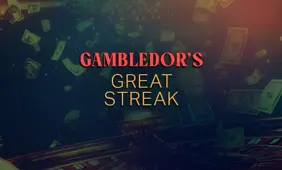R. Paul Wilson On: Gambling Systems and Advantage Techniques

Gambling is intended - at least by those who offer games to the public - as a form of entertainment, a fun, exciting, adult activity with potential rewards scattered amongst guaranteed losses. For a few, it’s an opportunity to make real money playing to improve their odds, perhaps swinging those odds against the house.
Gaming lore is filled with stories of incredible coups pulled by lucky players or systems of gambling that can ‘break the bank,’ but when playing for serious money, we need to sort truth from fiction and analyze our chances with cold hearts and clear eyes.
The Rigorous World of Advantage Gambling
Personally, I’m a terrible gambler.
Whenever I’ve played, it’s almost always been as part of a team seeking advantage through solid mathematical strategies such as card counting, ace locating or shuffle tracking. It wasn’t exactly fun, but it appealed to me Intellectually and fed my curiosity about how casinos can be defeated within the law but never spurred me to play on my own “just for the fun of it”.
As many visitors of the major land-based casinos will tell you, most people are just there to have fun and losing money at the tables (with the merest possibility of winning) is part of the entertainment between rounds of eating, drinking and partying. These are the people who keep the dice rolling, the cards turning, and the wheels spinning, and the casinos love them all the way to the bank while a tiny number of players, whose money is just as green, bring an action that’s much more dangerous to the gambling venue’s bottom line.
Advantage players - TRUE advantage players - are a minuscule minority amongst gamblers, yet they are perceived to pose such a threat that entire games have been slowed down and profits sliced just to make things more difficult for that minority.
That means if you want to play at a higher level, it’s important to know what you’re getting into.
Understanding odds and expectations based on factors such as accuracy, game speed, and bet sizing is essential to knowing how effective a gambling system is, but a serious player must also consider expenses and variance in these calculations to know whether playing successfully will actually be profitable and how much money is needed to survive negative swings.
This is the difference between playing and working, and make no mistake, beating the house requires a LOT of work.
Card Counting vs. Dice Control
Let’s consider two popular gaming strategies from this perspective:
Card counting has a definite edge when played skilfully both in terms of playing the game and not being backed off before you can turn a profit, but positive results are not based on single sessions. Professionals assess their results over time, and expert players carefully track costs like hotels and travel expenses alongside how many hot shoes they hit in a given session.
Dice control - whether you believe in it or not - is far more difficult to assess since there is no consistent (proven) mathematical edge over time, meaning players must have a little faith in supposed benefits and advantages created by throwing two plastic cubes in an effort to defeat the laws of physics. That said, dice controllers often claim great benefits to their methods, though I’m yet to see a consistent pattern collected via millions of rolls since (unlike counting) this is impossible to do in a computer unless you program it to be a believer in that “system”.
The difference between these two approaches to gambling is that one has a proven mathematical edge that casinos spend too much time and money trying to detect, while the other requires belief in its efficacy and is usually indulged by dice and craps games around the world. The important distinction is that one of these two systems can be measured before, during and after play, while the other can only be properly assessed based on the outcome.
This is not to say both cannot be profitable for lucky players, but if you wish to play with a true advantage, it must be mathematically provable. Whatever gambling system you choose to invest in needs more than hope or anecdotes, and while pre-setting dice before throwing them against a textured wall may have benefits, I have yet to see hard evidence of that.
Chasing Wins and Forgetting Losses
Here’s where it can get a little sticky.
Playing to gain a mathematical edge and grinding that edge into a profit takes time, practice and experience; even if you win (or lose) big first time out the gate, the odds will eventually even out for players who monitor their results honestly.
As a craps player, I like to play a crowded tub and keep my bets simple by betting the Pass Line and taking Odds - as vanilla as gambling flavors get - while enjoying the energy of the table for as long as my stack will allow.
I’ve shared this approach with many friends visiting Las Vegas, and most agree it’s a good way to spend some money and do the “Vegas thing” without losing their shirt; others quickly get tired of simple bets and are attracted to place bets around the felt, following the lead of others and damn if they don’t hit those bets more often than not!
That’s when my advice seems overly cautious - timid, perhaps - and before you know it, that friend hears Elvis sing the iconic soundtrack of “Viva Las Vegas” while slamming free drinks and high-fiving their neighbors.
On one occasion, a friend went home with a huge win while I barely paid for dinner, and that friend continued to crow about his success for weeks afterward until it became clear he had started playing regularly and - you guessed it - had paid back thousands more than he won that first night. Over time, my rate of loss was much slower than his, and since I occasionally gave my bankroll a bump with other games, I ended that trip in profit while he paid dearly for his time on the floor.
Amazingly, he still talks about how he won much more than I did at that first craps game, I suppose because that’s what he chooses to remember.
This is not an unusual story, and I find it interesting how gamblers remember their wins and how quickly they dismiss their losses.
Final Thoughts
Learning to assess long-term success is no different than learning to weigh oneself regularly, it might be bad news, but you simply cannot manage what you don’t measure!
Advantage players regularly monitor their bottom line and consider all factors to fully understand their actual success rate so if their bankroll goes down, they might accurately identify the cause.
It’s fine if you just want to enjoy the good times and ignore the bad - so long as you can afford it - but if you adopt any kind of system, you cannot claim that system to be effective until you can illustrate (to yourself) a long-term pattern of profits compared to playing purely at random.
Next, we will compare the most popular gambling systems among players and assess each one for true winning potential, difficulty and long-term benefits.





Review this Blog
Leave a Comment
User Comments
comments for R. Paul Wilson On: Gambling Systems and Advantage Techniques